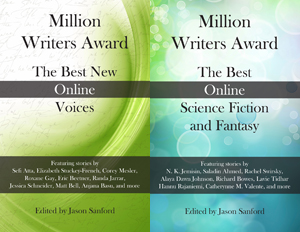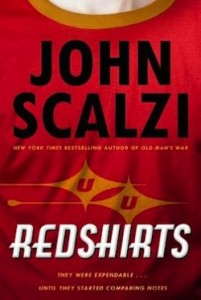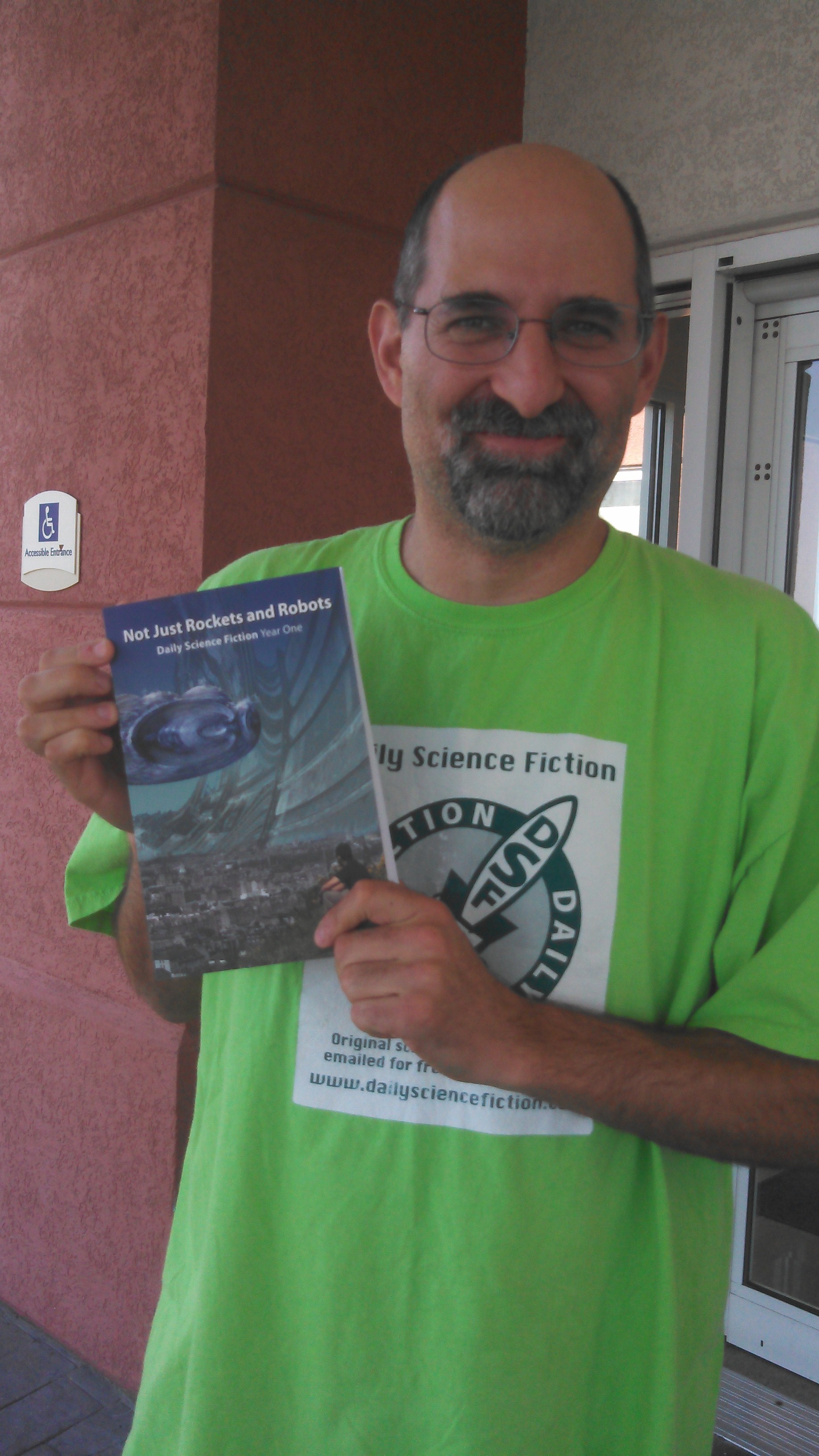written by Frank Dutkiewicz
No need to chatter on in an intro today. Instead, why don’t you enjoy our insights for Daily SF‘s October tales.
Space Mama by Karen Heuler (debut 10/1 and reviewed by Dustin Adams) is written in a series of short humorous articles similar to Dear Abby – in space. This isn’t a traditional story, as you will discern quite quickly.
Read this if: You’re up for some micro-stories (They really are quite clever). If you want bits-o-humor. If you only have a few minutes. (Keep it up on your phone and read a few as you go.) Or you wonder what people’s personal problems might be like five hundred years from now.
Willy by Deanna Kay Morris (debut 10/2 and reviewed by Frank D).
Willy is a janitor who has lost his arm. The missing appendage doesn’t mean his career is over, however. A small vacuum is put in its place. The replacement allows him to keep his job, and advancement is possible, as long as he doesn’t mind an upgrade or two.
“Willy” is a tale where workers are faced with choices , if you want to benefit in this society, you must be willing to make sacrifices. The subtle moral was not lost on me.
A forgotten school girl has attached herself to Connor. In Echo by Alexander Grunberg (debut 10/3 and reviewed by Frank D), Connor picks up a pencil that has fallen under his desk and hands it back to its owner , the girl seated behind him. The brief encounter has left an impression on the poor girl. She loses herself, completely, and becomes Connor’s shadow.
“Echo” is a tale of wanting. The girl has become somewhat of a soul mate of Connor, except Connor doesn’t wish to reciprocate her desire. The shadow accompanies him through life and is a nuisance at first. An elder Connor discovers he has come to need his permanent shadow.
I would describe this tale as a flashback love story (going to trademark that term). I liked it.
Superhero Art by Cat Rambo (debut 10/4 and reviewed by Dustin Adams).
Rarely do we see superheroes during downtime. Let’s face it: without super villains, is there much for a hero to do? But what if they had the same problems we did, and what if they cheated on their wives?
Cat Rambo takes us on a disturbing journey through the lives of several superheroes through the eyes of a biographer. What he sees isn’t always pleasant, but for us readers it’s always interesting. Note: Heed the Editor’s note on this one. There’s quite a bit of salty language and explicit situations.
The Frog Prince by Jonathan Vos Post (debut 10/7 and reviewed by Frank D), is another take on the ‘princess kisses enchanted toad’ fairy tale, technically speaking. The protagonist contemplates her upcoming nuptials to a less-than-bright prince when she encounters a frog with an equal intellect as herself.
This tongue-in-cheek retelling of a popular tale has two characters that use scientific jargon to converse. I pictured Sheldon Cooper and his girlfriend Amy (of Big Bang Theory) in the roles as I read it. Neat.
Parents that are willing to sacrifice for their children leave an even greater burden on their offspring in The Perfect Coordinates to Raise a Child by Barbara A. Barnett (debut 10/8 and reviewed by Frank D). Stacie house-hunts in a neighborhood where all the children excel. All it takes is a small self-sacrifice , such as a body part , and your child will be a genius. The association representative conducts a tour with her brilliant daughter, Rosalie: a child who can relate the precise coordinates of any location. Stacie worries what she will need to lose for the sake of her unborn child until Rosalie offers her the coordinates of a house where Stacie should raise her baby.
“The Perfect Coordinates” is a tale of parental ambition. The people of the home owners association sacrifice an extraordinary amount for the sake of their prodigy children without realizing what their kin lose in the process.
A delightful tale. An excellent metaphor on vicarious aspirations.
Recommended.
Revenge is a complicated dish to create. Gather Your Bones by Jenn Reese (debut 10/9 and reviewed by Frank D) is a tale narrated from the perspective of a witch. Her latest client is broken-hearted and seeks emotional restitution. The protagonist examines her client’s memories and asks for the items that defined their relationship.
“Gather Your Bones” is a story narrated by a witch who delights in her client’s bitter mood. The protagonist savors in the man’s thirst for revenge against his former lover. The story makes me grateful that a witch like the protagonist does not exist, because I could see such an evil woman enjoying a thriving business from an abundance of customers. An excellent tale, wonderfully told.
Recommended.
Chronology of Heartbreak by Rich Larson (debut 10/10 and reviewed by Frank D).
Time-traveler preempts a nasty breakup. Very brief and a bit cryptic.
Every person has a hero hidden within, and a villain bursting to come out. Doomsday Will Come With Flame by Anaea Lay (debut 10/11 and reviewed by Frank D) is the tale of a brave inventor whose exploits earned him a spot among Earth’s greatest heroes. The protagonist is the only one capable enough to counter the evil Maligno’s carnivorous flying monkeys. The Vigilance League is fighting a losing battle until a new mysterious hero, named Ti, appears to save the protagonist and stop Maligno for good. She has a soft spot for the protagonist inventor, but has a hidden agenda that makes her far more dangerous than a dozen supervillains.
“Doomsday” is a tale of deceit and attraction. Ti is nothing like a hero. Her supernatural powers are beyond superhuman. The heroes of the Vigilance League are in over their heads and only the unassuming inventor has any chance of stopping her. But the man never really wanted to be a hero, and Ti is one woman who can offer him something different.
As a person who has had a chance to view many of Anaea Lay’s works before they had the chance to see the light of day, I confess I marvel at her ability to write wonderful and brilliant short stories. This one, however, left me confounded and confused. By her explanation for her inspiration for this piece, it appears this is one tale that got away from her and turned into something she never planned. If so, the story itself serves as a metaphor on her own writing process. Well done?
Conjugation by Rich Kloster (debut 10/14 and reviewed by James Hanzelka)
I led her through my cities, slowly, saving the best for last: Berlin in the old Weimar Republic. We walked through the park, stood on the bridge and stared in the black water. Then we made love. When it was time, and the keepers had come, we bartered: exchanging memory and sensory feelings with each card we passed between us. And when she was gone I met with Sidra. Her exchange with Maia’s partner had also been successful, if more practical. “You liked her.” Sidra said. “Yes, humans can be very interesting,” I said.
I found this story a little predictable and a little confusing at the same time. The author does a good job of creating characters you can relate to, however I never got a real sense of what their motivation was for what they were doing. Did they lack the ability to really develop their own feelings, or was this like an exchange of ideas for some kind of pleasure-seeking exercise? Others seemed to have liked it more than I did, so if you are into existential metaphors check it out.
Home Invasion by Steve Rasnic Tem (debut 10/15 and reviewed by James Hanzelka)
The two officers at the door looked skeptical. Maybe it was the rundown neighborhood. Maybe it was the lateness of the hour. Perhaps it was the aluminum shorts Clarence had fashioned for protection. He didn’t mind their doubts, he been laughed at before – which he might have taken better if it hadn’t been his analyst doing the laughing. Clarence is being invaded by small aliens, or thinks so. But just because you are paranoid, doesn’t mean they aren’t out to get you.
I really liked this story. An interesting take on the old premise of: what if those that we think are crazy are the ones that are really sane? The author does a good job of putting us in Clarence’s shoes with humor and empathy. Give this one a read and you’ll have a better day. Unless, of course, you start to notice some smaller pieces of aluminum that seem to constantly be out of place.
Negative Space by Antonia Harvey (debut 10/16 and reviewed by James Hanzelka)
It took a long time for Lucy Morgan to die. Hers was an unremarkable death, a slow unraveling skin and synapses that left nothing behind but dust and the lingering scent of lavender. It began that morning in the shower, when she noticed that her idle fancies were slowly being washed down the drain. On the way back from the store her sense of perspective sloughed off like a snakeskin and formed puddles in the street. At work the photocopier was clogged by dark hair and the memories of her father.
This short story is very long on metaphor, but it was a little too esoteric for me. The author is very creative in the use of symbolism to intertwine the physical and the metaphysical, but for me it was just one long series of metaphors. The author appears to be more interested in demonstrating their mental capacity than keeping the reader interested.
Crisis on Titan by Powers-Smith (debut 10/17 and reviewed by James Hanzelka)
“Now we switch to Shavonne Robinson for a report on the Quality Mining Company disaster on Titan.
“Thank you Janet, the disaster that has claimed the lives of seventeen hundred†�”
“That would be 2350, Shavonne”
“What?”
“We hadn’t counted the families of the miners lost.”
Bottom third scroll: [Death toll on Titan nears 3,000]
“Oh,..”
“You’re sure we will be able to see the moon, Jupiter is awfully far away.”
“It’s Saturn, Janet, and yes we should be able to see the moon in this quadrant. The fire has ignited the methane lakes so it should be quite visible.”
This story is done as a mock newscast with both the talking head and the supposed science “specialist” demonstrating a unique lack of knowledge about the disaster taking place. The story highlights the premise that even though we may progress technologically we seem to be regressing intellectually as a species. The author does an excellent job of drawing out this premise throughout the story. He also focuses on the parochial nature of the species with the ending. Well done and well worth the read.
In Another Life by Kelly M Sandoval (debut 10/18 and reviewed by Frank D).
Clara lives another life. She slips into an alternative reality where another Clara didn’t drive away the love of her life. Slipping is dangerous, but she isn’t like others who have destroyed their brains, lost in a world that isn’t theirs. Clara slips as a validation that her life with Louise isn’t over. She just needs to show Louise the other reality, and prove that they were really meant to be.
“In Another Life” is a grass-is-greener tale. Clara is obsessed with Louise, and addicted to her alternative life. Her psychologist isn’t fooled by her lies. Louise (her Louise) has moved on. Clara believes her alternative self is living her dream life.
This story is interesting with a finale that is very fitting. Nice twist.
One by Sinead O’Hart (debut 10/19 and reviewed by Frank D).
The protagonist of this overcrowded dystopia future is a school-aged girl named Unubert, adapting in a cold, only-child society. Her mother has awakened ill. Her father is annoyed while young Unubert has a slight concern that her Mum will be decommissioned. Decoms are bitter but a part of life. After all, there is only so much room in the world, and in a family member’s heart, to spare.
“One” is a tale that serves as an entertaining commentary on the one-child policy some eastern nations have adapted. The world in which Unubert lives is hard and unforgiving for the unwanted. Ms O’Hart brings to light the drawbacks of allowing only a single child in a family, and of the detriment to the women of such a policy. Well done.
Flying Matilda by Gio Clairval & Cat Rambo (debut 10/22 and reviewed by James Hanzelka).
Every time they saw the apparition it meant more acrobats would die; the shimmering glow forcing them to unhitch their harnesses and crash to their deaths. The headlines read, “Pale Glow, The Merciless Killer”; and “The Man of the Mist won’t stop until all the Acrobats are dead”. Hunts were commissioned, all failed. Then she came along and took the job. She alone was impervious to his will. All the hunters and acrobats around her fell to their deaths, she unhooked herself and floated out to meet him at the top of the tent.
This story is a fantasy set around a world that lives within a circus. The authors did a good job of setting up their reality and creating a conflict, it just wasn’t enough to draw me in. They had a decent enough premise, that of the interplay between humanity and artifact, but for me it was too obscured by the fantasy of the world they had created. Fantasy lovers should enjoy the tale though.
Nesting by Mariel Herbert (debut 10/22 and reviewed by James Hanzelka).
I was on my third drink when she walked in the bar. “Is that what I look like?” I thought to myself. All long legs and desperation she melted into the chair next to me. Some small talk and we ended up in bed for the night. The next morning was all too familiar. After my shower I was prepared for the standard “Good-bye” speech, but she surprised me and asked to stay and share the apartment. “I could take some of your clients. They’d never know it wasn’t you.” So after some discussion we embarked on a new life, the two of us.
This story asks the question, “Can robots of the same sex find true love?” I thought the author did an excellent job of setting up both the reality and the premise as he rolled out a somewhat tilted noir scenario. The old veteran takes the younger novice home, only to fall in love with her. The homosexual overtones aside, I thought she did a very good job of conveying both context and subplot throughout the story. Nicely done. Not for everyone, but worth the read.
A series of simple questions are the theme of this un-simple title in 36 Interrogations Propounded by the Human-Powered Plasma Bomb in the Moments Before Her Imminent Detonation by Erica L. Satifka (debut 10/24 and reviewed by Frank D). The protagonist of this list compiled story is of a human altered into a weapon. The questions are aimed at a benevolent alien species. No answers were forthcoming.
Hmmm. I somehow expected a different outcome.
A woman travels back into her memories to visit her younger self in Time Travel, Coffee, and A Shoebox by Nina Pendergast (debut 10/25 and reviewed by Frank D). The protagonist is about to make history as the first woman to experience simulated time travel. The journey is to broadcast as a reality TV program. Upon seeing her younger self, the protagonist realizes some things are just too precious to share.
“Time Travel” is a tale of rediscovery. The visit, although only a simulation, is nevertheless real to the protagonist. She revisits dreams she had long forgotten and examines past concerns that seem silly now. The visit for her is like meeting a departed relative. I found the story sweet and enlightening.
Irresistible offerings in rare vending machines tempt three men in Cuddles by A. A. Lowe (debut 10/28 and reviewed by Frank D). Genetically altered pets are the desire of one character in this odd premise. The men search old motels in hopes of finding a kitten.
Strange piece.
A customer awaits the final delivery for a desirable package in Lost in Transit by K.B. Sluss (debut 10/29 and reviewed by Frank D). Body parts arrive by mail, one package at a time. The protagonist’s excitement grows as her product is assembled. One last delivery , the most important part , is expected, but alas, it never arrives.
“Lost in Transit” is a neat little tale. Shocking that such a complete and stimulating tale was written in the frame work of a flash tale. Very well done.
A daughter visits her intrusive mother in The God of Rugs by Nina Kiriki Hoffman (debut 10/30 and reviewed by Frank D). Karen rarely visits her Mom. The rugs in her place have a mind of their own, limiting Karen’s freewill without consequences. A throw rug gets a little intimate with Karen when her mother leaves the room.
I found this piece to be a little weird.
A grieving spouse is willing to pay a magicians stiff price to resurrect their better half in The Bestowal of the Magician by Tianyue Zhang (debut 10/31 and reviewed by Frank D). The husband of a departed mate has pawned much of their belongings to finance a necromancer’s fee. His wife won’t remember much, which will be a shame because the final price to bring her back is great indeed.
I found this story clever but predictable.
A million and three-hundred and thirteen
storySouth’s Million Writers Award has published their winners for 2013. Sadly, none of the Daily SF tales were in the running but several DSF authors did make their short list. storySouth will be accepting nominations for their 2014 awards very soon. We at Diabolical Plots will be providing our own best of 2013 DSF tales in the coming weeks. Please give our suggestions a look and consider them as your nominee for the award.
We would also like you to consider our own prolific David Steffen for the awards honor as well. 2013 has been a banner year for him, his work appearing in nine publications over 2013. Most of them were flash fiction publications, which aren’t eligible for the award, but his story “Could They But Speak” published at Perihelion is eligible.
 Each year, the Million Writers Award offers prizes to the authors of the winning story, a runner-up, and an honorable mention. These prizes are possible thanks to your generous support. Please click on the donate link below to offer your support. Donors have the option of being listed on the Million Writers Award Page or remaining anonymous. Donations are not tax-deductible. Except for the small percentage collected by PayPal to facilitate the transaction, all of your donation goes to fund the Award.
Each year, the Million Writers Award offers prizes to the authors of the winning story, a runner-up, and an honorable mention. These prizes are possible thanks to your generous support. Please click on the donate link below to offer your support. Donors have the option of being listed on the Million Writers Award Page or remaining anonymous. Donations are not tax-deductible. Except for the small percentage collected by PayPal to facilitate the transaction, all of your donation goes to fund the Award.
For additional questions or inquiries about the Million Writers Award, contact storySouth editor Terry Kennedy at terry@storysouth.com. For general updates about the award, be sure to check out storySouth.




